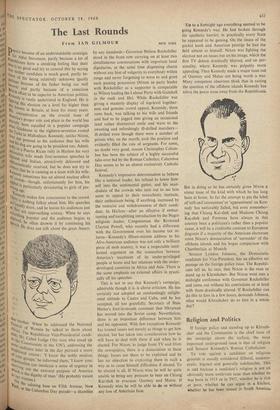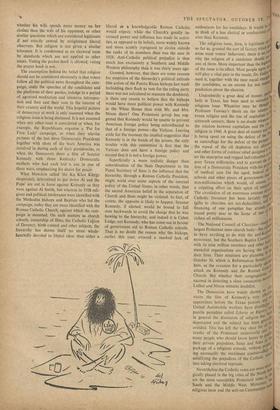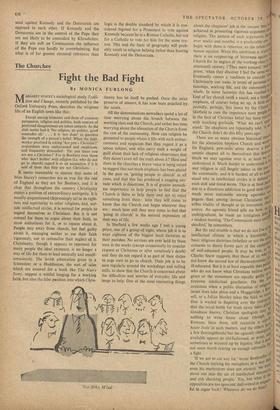Religion and Politics
If foreign policy and standing up to Khrush- chev and the Communists is the chief issue of the campaign above the surface, the most important underground issue is that of religiOn and Senator Kennedy's Roman Catholicism.
To vote against a candidate on religious grounds is usually considered illiberal, undemo- cratic, bigoted and generally indefensible. This is odd because a candidate's religion is not an obviously more irrelevant issue than whether he was born in 1913 or in 1917, whether he is rich or poor, whether he can argue in a kitchen, whether he has been stoned in South America, whether his wife spends more money on her clothes than the wife of his opponent, or other similar questions which are considered legitimate if not exactly central by enlightened liberal observers. But religion is not given a similar tolerance. It is condemned as an electoral issue by standards which are not applied to other issues. Voting the pocket book is allowed; voting the prayer book is not.
The assumption hehind the belief that religion should not be considered electorally is that voters follow all the political news throughout the cam- paign, study the speeches of the candidates and the platforms of their parties, indulge in a period of agonised meditation and intensive introspec- tion and then cast their vote in the interest of their country and the world. This hopeful picture of democracy at work is only assumed when the religious issue is being discussed. It is not assumed when any other issue is considered or when, for example, the Republicans organise a `Pat for First Lady' campaign, or when they televise pictures of the last three Democratic Presidents together with shots of the wars America was involved in during each of their presidencies, or when the Democrats show a film of Senator Kennedy with three Kentucky Democratic mothers who had each lost a son in one of these wars, emphasising his desire for peace.
What Mencken called `the Ku Klux Klergy desperately determined to put down Al and the Pope' are out in force against Kennedy as they were against Al Smith, but whereas in 1928 reli- gious and political intolerance were identified with the Methodist bishops and Baptists who led the campaign, today they are more identified with the Roman Catholic Church, against which the cam- paign is mounted. On such matters as church schools, censorship of films, the Catholic Legion of Decency, birth control and other subjects, the hierarchy has shown itself no more whole- heartedly devoted to liberal ideas than either a liberal or a knowledgeable Roman Catholic would expect; while the Church's greatly in- creased power and influence has made its activi- ties, as opposed to its beliefs, more widely known and more acutely repugnant to circles outside the ranks of its members than was the case in 1928. Anti-Catholic political prejudice is thus much less exclusively .a Southern and Middle Western philosophy than it was thirty years ago.
Granted, however, that there are some reasons for suspicion of the hierarchy's political attitude (the action of the Puerto Rican bishops last week forbidding their flock to vote for the ruling party there was not calculated to reassure the doubters), is there any reason to believe that the bishops would have more political power with Kennedy in the White House than with Mr. and Mrs. Nixon there? One Protestant group has sug- gested that Kennedy would be unable to prevent American foreign policy being subordinated to that of a foreign power—the Vatican. Leaving aside for •the moment the implied suggestion that Kennedy is in the hands of the priests, the only trouble with this contention is first that the Vatican does not have a foreign policy and second that it is not a foreign power.
Superficially a more realistic danger than subordination of the State Department to the Papal Secretary of State is the influence that the hierarchy, through a Roman Catholic President, might wield over some aspects of the internal policy of the United States; in other words, that the sacred American belief in the separation of Church and State might be violated. In fact, of course, the opposite is likely to happen. Senator Kennedy, if elected, would be bound to fall over backwards to avoid the charge that he was bowing to the hierarchy, and indeed it is Cabot Lodge, not Kennedy, who has come out in favour of government aid to Roman Catholic schools. That is no doubt the reason why the bishops, earlier this year, evinced a marked lack of enthusiasm for his candidacy. It would be to think of a less clerical or confessional lid' clan than Kennedy. The religious issue, then, is legitimate oni) so far as, granted the sort of factors which d:. mine most voters' behaviour, there is no re;', why the religion of a candidate should not one of them. More important than the legitiLdt:. of the issue is its effect. Most people agree IP will play a vital part in the result; Dr. GaillJd, used it, together with the near equal streak..` the candidates, as an excuse for not maki4 prediction about the election. Undoubtedly a great deal of money, Part larly in Texas, has been used to sandal!, religious issue. Whatever may be thou, Professor Tawney's thesis on the relathat tween religion and the rise of capitalism al sixteenth century, there is no doubt whatevef .,e the relation between capitalism and the religion in 1960. A great deal of money aadmf is being spent on using the defeat of the as camouflage for the defeat of the prosPe've, the repeal of the oil depletion tax all°°fos and other forms of outdoor relief designed t°f ter the enterprise and rugged individualista °c1, poor Texan millionaire, and to prevent tbe tion of a Democratic President with-his lltdidt; of medical care for the aged, federal !tip t: schools and other pieces of government °oil non-millionaires which would, of course, a crippling effect on their spirit of erdesrPoo. The circulation of an enormous amount c' Catholic literature has been lavishly (gifts to churches are tax-deductible), an bee financing of one pamphlet has alreadY itg traced pretty near to the home of one el richest oil millionaires.
The National Council of Churches—olud largest Protestant inter-church body—has fle • to have anything to do with the anti-Ke''„oe movement, but the Southern Baptist Convc' with its nine million members and other fag of mentalist organisations are having the titto their lives. Their ministers are planning tu.olt October 30, which is Reformation Suncla)°ted here, as the occasion for a particularly alit attack on Kennedy and the Roman Cattioill Church. But whether their congregations ..co succeed in detecting a close connection het
Luther and Nixon remains doubtful. tele
The Democrats have widely shown °all live vision the film of Kennedy's veryc'eAthc appearance before the Texan pastors, $ United Automobile workers have distriblthe but puerile pamphlet called Liberty or Big°11'beeo in general the discussion of religion has icellY deprecated and the subject has been genii the avoided. This has left the way clear for a; fOr cranks of the Protestant underworld an"ddie many people who should know better to Pe the their private prejudices, hates and fears °due' package of a religious crusade, without Prei of ing necessarily the maximum counter-eilec tef, solidifying the prejudices of the Catholic ve into taking electoral reprisals. Nevertheless the Catholic votes arc more str3t:t; gically placed in the big cities of the North, t the are the most susceptible Protestant votes la itic South and the Middle West. Moreover.. so religious issue and the soft-on-Communism
tle
When paying your life assurance premiums, do you ever ask yourself:
















































 Previous page
Previous page